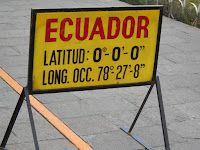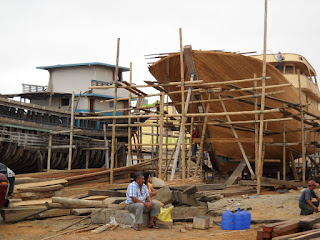 Over the past month, I have seen a glimpse of the beauty of Ecuador. From the snow-capped volcano Cotopaxi that greets me in the morning on clear days to the fish markets that characterize coastal towns like Manta, Ecuador is at once filled with the sleeping peace of ancient peaks alongside the bustle of commerce and barter that fill each new morning.
Over the past month, I have seen a glimpse of the beauty of Ecuador. From the snow-capped volcano Cotopaxi that greets me in the morning on clear days to the fish markets that characterize coastal towns like Manta, Ecuador is at once filled with the sleeping peace of ancient peaks alongside the bustle of commerce and barter that fill each new morning.Quito is ringed by volcanoes, and during my first weekend in Ecuador I had the opportunity to take a cable car and then hike to a point at the base of Pichincha. Reaching an elevation of over 4,100 meters, I climbed to the highest point I have ever visited, and the view of the city and the surrounding farmland was majestic.

 The day before that, I took a quick ride to the middle of the world...er...the equator. They call it the mitad del mundo here to distinguish from the name of the country. As I stood with one foot in the Southern Hemisphere and one in the Northern Hemisphere, it struck me how far I had traveled. Michigan is halfway between the equator and the North Pole, and I had crossed the 45th parallel several times. Yet suddenly I found myself at that geographical landmark that I had previously only known as a line on a world map.
The day before that, I took a quick ride to the middle of the world...er...the equator. They call it the mitad del mundo here to distinguish from the name of the country. As I stood with one foot in the Southern Hemisphere and one in the Northern Hemisphere, it struck me how far I had traveled. Michigan is halfway between the equator and the North Pole, and I had crossed the 45th parallel several times. Yet suddenly I found myself at that geographical landmark that I had previously only known as a line on a world map.Besides the natural wonders of Ecuador, I am always intrigued by the daily life here. When I was on the Pacific Coast to visit Las Mercedes, we visited a fish market where one could purchase anything from sharks to $800 tuna to shellfish.
 Gaviota birds swooped down to steal fish as they were carried from the motorboats to the shore, and pelicans did their own fishing in the distance.
Gaviota birds swooped down to steal fish as they were carried from the motorboats to the shore, and pelicans did their own fishing in the distance. Competing with the calls of fish sellers was the constant hum of chainsaws and hammers at the shipyard a few meters down the beach.
Competing with the calls of fish sellers was the constant hum of chainsaws and hammers at the shipyard a few meters down the beach.

Back in Quito, there is a part of the city called La Ronda, which comes alive at nightfall with all the charm of the colonial era. Over the rofs of the ancient buildings gleams the clock tower of the cathedral, and down the twisting cobblestone road one can purchase traditional drinks and appetizers from the doorways of shops. These are just a flavor of the rich culture and geography of Ecuador, and I look forward to experiencing more of this country in the coming months.
Next up: Monica's Restaurant










